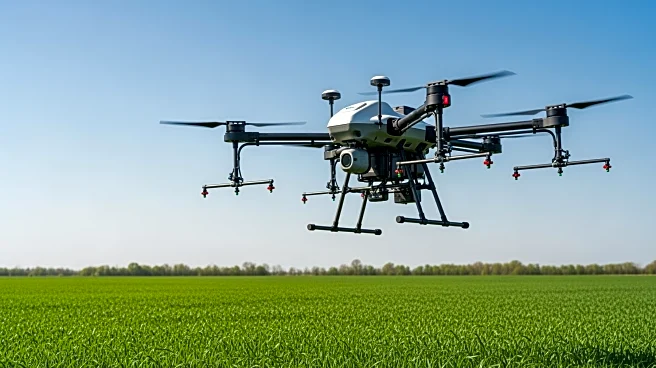What's Happening?
Saudi Arabia's agriculture equipment market is expected to grow significantly, reaching USD 2,424.3 million by 2033, according to IMARC Group's latest research. The market, which was valued at USD 1,684.5
million in 2024, is projected to expand at a compound annual growth rate (CAGR) of 4.1% from 2025 to 2033. This growth is driven by the adoption of AI-powered precision farming tools, which enhance crop yields through real-time monitoring of soil, weather, and plant health. The Saudi government is investing in AI agricultural initiatives, funding startups that develop robotic harvesters and automated tractors. Additionally, partnerships with global AI innovators are launching smart irrigation systems to optimize water use. Government schemes aimed at building national food security, such as the Ministry of Environment, Water and Agriculture's initiatives, are subsidizing equipment costs and offering low-interest financing to modernize operations.
Why It's Important?
The expansion of Saudi Arabia's agriculture equipment market is crucial for enhancing domestic food production and ensuring national food security. The government's focus on AI and smart farming technologies is expected to increase efficiency and reduce costs for farmers, making advanced farming techniques more accessible. This growth supports the country's broader vision of economic diversification and sustainability, aligning with initiatives like Vision 2030. The market's expansion also attracts global investment, fostering partnerships that bring advanced technology and expertise to Saudi agriculture. As the country prioritizes water conservation, the adoption of smart irrigation systems is vital for sustainable farming in arid regions.
What's Next?
Saudi Arabia is likely to continue investing in AI and smart farming technologies, with further government support expected to drive market growth. The focus on precision farming and controlled-environment agriculture will likely lead to more partnerships with international agri-tech firms. As the market expands, farmers may increasingly adopt advanced equipment, supported by government incentives and financing options. The ongoing development of infrastructure and resource projects will further bolster the agriculture sector, contributing to the country's economic growth and sustainability goals.
Beyond the Headlines
The integration of AI in agriculture raises ethical considerations regarding data privacy and the potential displacement of traditional farming jobs. As technology becomes more prevalent, there may be a need for regulatory frameworks to address these issues. Additionally, the focus on smart farming could lead to long-term shifts in agricultural practices, promoting sustainability and environmental conservation.










